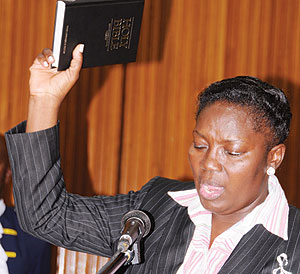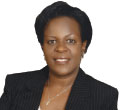THE East African Community (EAC) is making history in several dimensions – with the election of Rebecca Kadaga as Speaker of the Ugandan Parliament, the number of female speakers in the EAC region has raised to three.
 The Parliament of The United Republic of Tanzania and the Chamber of Deputies of Rwanda already have female Speakers. This is a clear indication of transformation because considering that Uganda has never in its 49 years of independence had a female Speaker.
The Parliament of The United Republic of Tanzania and the Chamber of Deputies of Rwanda already have female Speakers. This is a clear indication of transformation because considering that Uganda has never in its 49 years of independence had a female Speaker.
This transformation has partially been expedited by the NRM Government ably led by President Yoweri Museveni, global impetus spearheading advocacy for women’s rights; and most significantly increased access to education which has opened doors at all levels for women. Education and globalisation apart, character and attitude play a significant role.
Kadaga is an extremely intelligent, hard -working and tenacious person who has worked tirelessly for justice and equal opportunities for all. This placed at the right place, at the right time. Her tenure, like that of the other East African female speakers will no doubt change the politics of the region in unprecedented ways.
The unique advantage of women’s participation in politics has many attributes, some of these include the fact that women bring to the fore practical issues such as food, shelter, clothing and the well-being of the family.
Women also bring to the fore issues unique to them as a group such as infant and maternal health, cervical and breast cancer. They bring natural attributes as nurturers which include patience, perseverance and courage to name but a few.
At the East African Community level, the East African Legislative Assembly is currently in the process of debating the EAC Annual Budget Estimates for the Financial Year 2011/2012.
The theme of this year’s budget is: Implementation of the Common Market and laying the foundation for the Monetary Union. The year 2011/2012 will be a momentous one as the Community implements the Common Market and energises the process of establishment of an East African Monetary Union. The Budget Speech presented to the Assembly on May 19, 2011 recognised that: “the Gross Domestic Product of the region has increased from $46.5b to $74.5b over the period 2005 to 2009 while per capita income has gone from $402 to $571 over the same period.
This is great news considering that next phase of integration, which is the Monetary Union, will enable the East African Community to increase intra-regional trade since we shall all be using one monetary system.
It means that increasing per capita income from $571 to $1,000 will take an even shorter period and thus has capacity to spiral the East African Community into a middle income region in record time.
The Assembly approved a Budget of $77, 664,443 for the Financial Year 2010/2011. The Council this year requests for the approval of $109,680,319 for the Financial Year 2011/2012. This marked increase of over 41% which reflects the fact that with the deepening and widening of the integration process, more and more resources need to be committed to the EAC Budget.
One of the issues of concern is that out of the $109,680,319 for which approval is sought, $ 33,666, 700 will be contributed by Partner States while $75,307,769 will be contributed by Development Partners and other income amounting to $205,850.
This obviously means that our Development Partners are putting in almost twice as much into the EAC than the Partner States and yet all Partner States acknowledge that integration is a top priority in the development of the region. This state of affairs calls for more coordinated and consistent action. Whereas the contribution of Development Partners is appreciated, it is imperative for EAC Partner States to prioritise funding for the EAC integration in their respective budgets.
This calls for increase of contribution to the EAC Budget and more significantly for the EAC to expedite the process of establishing sustainable ways of financing the integration process such as taxing revenue. The fact that all the EAC Partner States have enjoyed benefits accruing from the operations of the Community and that so far, no economic imbalances have arisen out the integration process re-affirms the need for heightened commitment to integration.
In addition to this, the fact that all programs to be financed in the Financial Year 2011/2012 will result into increased revenue for the Community justifies more consistent support from Partner States. Priority programs that the EAC will focus on in 2011/2012 are:
- Implementation of the Common Market Protocol;
- Conclusion of the EAC Monetary Union Protocol;
- Deepening Cooperation in Defense, Security and Political matters;
- Implementation of EAC Institutional Review Recommendations;
- Promotion of Agriculture and Food Security and Implementation of Climate Change Action Plan;
- Promotion of regional multilateral trade;
- Expansion of regional Infrastructural facilities;
- Implementation of EAC Industrialisation;
- Investment promotion and Private Sector Development Strategies;
- Promotion of sustainable use of Environment and Natural Resources, Tourism and Wildlife Conservation;
· Enhancing EAC visibility and operationalisation of the EAC Development Fund.
One of the operational principles of the Community that govern the practical achievement of the objectives of the Community is – the EAC integration process must be people centered and market driven co-operation.
Each of us has a role to play right from the farmer who yearns to sell potatoes cassava across the boarder of Katuna and Gatuna right up to those who transact business via the Securities Exchange. Increased support of EAC integration will no doubt transform the EAC region into a middle income. This will in turn address political, economic and social challenges such as poverty, poor health, and conflict over scarce resources; more effectively.
By By Dora Byamukama, Uganda’s reprehensive in the East African Legislative Assembly

